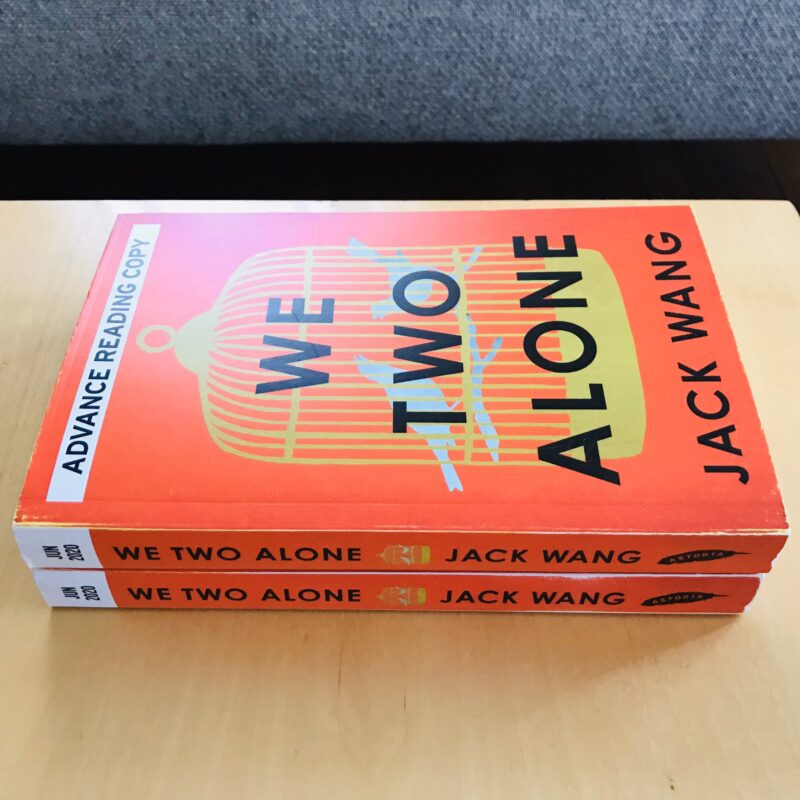#920 Rogue reverberating
We Two Alone
by Jack Wang
Toronto: Anansi, 2020
$19.95 / 9781487007461
Reviewed by William New
*
 Jack Wang is a welcome new voice in Canadian letters. I say ‘new,’ because We Two Alone is his first book of stories; but in fact he has been an active writer for several years. Since 2015 he has published stories in such journals as PRISM and Malahat Review (five of them reprinted/revised in We Two Alone), and with his twin brother (Holman Wang) he has developed at least fifteen titles for Chronicle Books’ ‘Cozy Classics’ series for children. Vancouver born, Wang was educated in Toronto and the USA; he currently chairs the writing program at Ithaca College (NY), and his first novel (working title: ‘The Riveters’) is scheduled for release in 2024, also from Anansi.
Jack Wang is a welcome new voice in Canadian letters. I say ‘new,’ because We Two Alone is his first book of stories; but in fact he has been an active writer for several years. Since 2015 he has published stories in such journals as PRISM and Malahat Review (five of them reprinted/revised in We Two Alone), and with his twin brother (Holman Wang) he has developed at least fifteen titles for Chronicle Books’ ‘Cozy Classics’ series for children. Vancouver born, Wang was educated in Toronto and the USA; he currently chairs the writing program at Ithaca College (NY), and his first novel (working title: ‘The Riveters’) is scheduled for release in 2024, also from Anansi.
I say a ‘welcome voice’ because this book — six stories and a novella — is serious, engaging, well crafted, thought-provoking. Wang clearly has something to say, and this accomplished collection not only says it but also promises a great deal more to come. The stories together deal with important social issues — or, more accurately, they portray a series of individual characters whose lives are thwarted by the social conditions that prejudge them. Racism is the predominant disabling force, but Wang does not construct simplistic binaries here; he shows racism to be many-layered, tied in differing ways with gender politics, sexuality, class, economics, and social opportunity. In the opening story, ‘The Valkyries,’ for instance, a boy — a keen hockey player who lives in Vancouver’s Chinatown—tries out for a local team (the year is c.1919), but his skill is ignored and his future redirected when coaches and players will not pass the puck to him. The story goes further. The era that the story portrays is also sexist and distorted by biases regarding sexual preference, which the boy may not initially appreciate but will definitely find out about. After being rejected by the men’s team, the boy impulsively disguises himself as a girl (As You Like It in reverse), joins a women’s team (one that’s less popular and far less well financed), and while he briefly succeeds on the ice, there will be repercussions. He is disowned when his mask is summarily ripped away — twice: by the white community because of so-called ‘cheating,’ by the Asian community because of perceived ‘dishonour.’

Subsequent stories, all set in more recent times, address a range of other discriminatory customs and habits. A friendship between a Chinese diplomat and a Jewish woman in Vienna in the 1930s falters because of religion and politics (the diplomat’s government is courting Germany at the time, for funds to support resistance to the Japanese incursion into China); a Chinese expatriate in South Africa becomes increasingly restricted when apartheid laws divide that country; a divorced ex-hockey player in Florida who has ‘fizzled into anonymity’ faces economic bias; a mixed race couple in London fails to rise above the hyper-polite class assumptions of one set of parents. In this last story, ‘Belsize Park,’ one of the most resonant in the book, a conversation between the young man and the young woman’s mother captures acutely what rumbles the relationship and yet is not being obviously stated aloud:
‘My grandfather… was part of the Merchant Navy. Helped to win the Battle of the Atlantic. He would have like to stay after the war, but he was . . . repatriated.’
‘Killed?’
‘No, deported.’
After a silence, Mrs. Turner glanced at her husband and said, ‘Both our fathers served in the war.’
‘Yes, of course,’ I said.
The six short stories in this collection all tend to follow familiar structural patterns: premise, slow rising action, climax, swift denouement — and Wang’s work has been associated elsewhere with Frank O’Connor’s notion of the short story as the medium that has been able to express the ‘lonely voice’ of a ‘submerged population group.’ Repeatedly, here, the narrator’s voice is that of a person recalling events from the past, events that appeared puzzling at the time but are understood—or given a context at least — by later perspectives. One recurrent image in the book, of a ‘Heywood-Wakefield tambour desk,’ further suggests Wang’s approach: a tambour desk is designed so that it folds open (rather than lifts up or pulls open, say), revealing only slowly the compartments within. The second time such a desk is mentioned, in the novella ‘We Two Alone,’ its emblematic function is overt: the two central characters Leonard and Emily are in the midst of a break-up, and the (omniscient) narrator observes that, to Leonard, it is unclear whether his conversation with Emily is about ‘life as it had been or life as it was unfolding, but his heart was still tundra, the thaw not yet begun so he didn’t say anything.’ Closure of some sort generally does occur in these stories, though it’s more like the implied indeterminacy of ‘accepted closure’ than any acceptable resolution to the real problems.

The novella ‘We Two Alone’ is captivating, in part because it demonstrates most clearly the developing formal skills that Wang brings to his craft. Throughout the book, a number of cultural and literary allusions (Lucretius, Larkin, the Coen Brothers’ film Fargo) add to the reader’s appreciation of the stories’ focus on varieties of isolation. The novella turns structure into agency. The main narrative concerns the life of two actors, one of whom – Leonard — achieves some minor success but continues to seek major recognition, to be a Shakespearean icon, to the detriment of much else in his life. But to compress the story into this single narrative line would be reductive: the story both narrates and expresses — so that what the reader hears through the story is a process as well as a set of events: the repeated demonstration of Emily’s continuing love and the gradual deterioration of Leonard’s mind into some unfolding form of dementia. The allusion to Cordelia and Lear is more than merely casual.
At one point late in the story, when Leonard has formed his own (Asian American) theatre company and is performing Shakespeare to a circuit audience, a young woman, his newest and most recently schooled cast member, accuses him of merely ‘performing Shakespeare’ and not ‘subverting him.’ It’s a critical sociological moment, arguing either/or — a declaration that there is a right way and a wrong way for literature to speak — and in context the young woman’s challenge could be taken as a revisionary subtext. It could also be heard as her practiced self-indulgence, which in turn could be mirroring Leonard’s own self-deception. The story makes it clear that jargon and profanity are not the only two linguistic options open to those who would change the world. After her challenge, Leonard replies, quoting the Roman poet Terence: ‘I am human, I think nothing human alien to me.’ She answers back, swearing at him. Words are uttered, if not quite exchanged. Then she abruptly leaves. But not before her words have some debilitating effect — Leonard is stirred by the fear that he may be deceived in his ambition, that he may be only ‘a novelty act.’ It’s not true, but it unsettles him. Importantly, it’s the fact of the fear, not the rhetoric of the political position, that matters here, and it is love that can salve it.
The story ultimately comes to a close with a direct quotation from Act V of King Lear (xxiv: 8-17):
We two alone will sing like birds i’th’ cage . . .//
we’ll live/
. . . and laugh/
. . . and hear about poor rogues///
And take upon’s the mystery of things/
As if we were God’s spies [my elisions].
Lear, reclaiming a way out of his madness, is at last unfolding before Cordelia, with Cordelia there to comfort and assure, and Wang’s narrative lifts from the page. This Lear is no mere performance: it’s part of a declaration. For the passage is quoted twice more — apparently deteriorating at first, leaving out roughly every other word, following Leonard’s mind into telling reverberations — as though we’re hearing an actor on stage stagger through his lost lines. Then, with the second repetition, we are left with three words only, but they’re key. ‘We two… rogues.’ They refuse passivity; they promise something unexpected, something we haven’t yet thought enough about: who persists and what prevails. It’s as though, after all the contrariness of their lives, Leonard and Emily are still managing not to give in but to celebrate: ‘We two’ and ‘rogues’ and the long space between.
*

William New is the author of Reading Mansfield & Metaphors of Form (McGill-Queen’s University Press, 1999); he has written widely on short fiction in Canada, Australasia, and elsewhere. He is also the author of a dozen collections of poetry, including The Rope-Maker’s Tale (Oolichan Books, 2009) and Neighbours (Oolichan, 2017). Editor’s note: William New has also reviewed books by Michael Kenyon, David Bergen, Darcy Bysouth, Julie Paul, Philip Huynh, and B.A. Thomas-Peter for The Ormsby Review.
*
The Ormsby Review. More Books. More Reviews. More Often.
Publisher and Editor: Richard Mackie
The Ormsby Review is a journal service for in-depth coverage of B.C. books and authors. The Advisory Board consists of Jean Barman, Robin Fisher, Cole Harris, Wade Davis, Hugh Johnston, Patricia Roy, David Stouck, and Graeme Wynn. Scholarly Patron: SFU Graduate Liberal Studies. Honorary Patron: Yosef Wosk. Provincial Government Patron since September 2018: Creative BC
“Only connect.” – E.M. Forster

5 comments on “#920 Rogue reverberating”